We're an affiliate
We hope you love the products we recommend! Just so you know, we may collect a share of sales or other compensation from the links on this page. Thank you if you use our links, we really appreciate it!
Growing up in a household with fewer siblings to divide the chores it is a massive headache. After surveying teens and couples about which household chores they found the most difficult to collaborate on, I concluded that it is none other than washing dishes after colossal family dinners, events, or routine tea breaks. Just when I was juggling through techniques and strategies through the internet to help avoid this daily argument of “who will be washing the dishes,” DISHWASHERS came to the rescue!
A tremendous saving in time and effort is represented by automatic dishwashers. They help you avoid constantly losing your expensive cutlery items and kitchen utensils by the mishandling and breakage that stems from manual dishwashing. Dishwashers also help to keep the look of your marbled kitchen preserved, neater and more clutter-free.
But then the infamous question arises:
WHAT IS A DISHWASHER
A dishwasher is a technological advancement that is one of its kind. It is a mechanical device consisting of automatic machinery used to wash, rinse and clean dishware and cutlery items. It ends the era of manual dishwashing, which demands heavy scrubbing and double rinsing to get rid of soiling. The mechanical dishwasher cleans by spraying hot water, usually between 45 and 75 °C, at the dishes, with lower temperatures used for delicate items.

HOW DOES A DISHWASHER WORK
A typical dishwasher consists of one or more rotating sprayers (depending upon your model), in which a dishwasher detergent along with water is pumped. Unlike manual dishwashing, where detergent once used cannot be used over again, a dishwasher allows you to reuse the detergent by recirculating it again with a new set of dishes. Dishwashing often includes a pre-rinse in order to loosen the soiling and help with more efficient cleaning. The pre-rinse may or may not include a detergent. The water is drained once one round of wash is finished, and an electro-mechanical solenoid valve is used to admit more hot water into the tub. The water is drained after the rinse process terminates, and one of the several drying methods is used to dry the dishes.
READ ALSO:
HOW TO CLEAN DISHWASHER AIR GAP
HOW TO FIX DISHWASHER NOT DRAINING
5 COMMON MISTAKES WHILE USING DISHWASHER
1-PILING UP DISHES
We understand that you might be tempted to pile up items in the dishwasher to cut off on that extra cycle and save time, energy, water, and detergent. It is like us to stuff in that last coffee mug and that extra bowl into the dishwasher, which might not be able to get a space on the rack otherwise. BUT HERE’S THE TRUTH: Piling up dishes in the dishwasher restricts the water jets from reaching the plates, and boom! In an attempt to get that one coffee mug and that extra bowl cleaned in the first round, you now have ended up with 15 half-cleaned dishes!
2- PRE RINSING
A prevalent mistake all of us attempt in hopes of saving our dishwasher and expanding its life is pre-rinsing dirty dishes. But let me put it out for you: It is entirely unnecessary and might even result in more dirty dishes.
There is something called a turbidity sensor incorporated into dishwashers which measures the amount of soil in the first rinse cycle and accordingly lowers the power supply, and your dishes might come out dirtier.
3- NOT REMOVING STUCK FOOD
Bigger food particles and chunks of leftover food might mess with your dishwasher machinery resulting in reduced dishwasher life and dirty crockery. To improve the quality of your dishwashing, manually remove pieces of leftover food from the dishes before loading them into the dishwasher.
4- PLACING PLATES CLOSER
Dishwashers usually have separate slots for plates, and stuffing two or more plates up in the same slot shall result in the detergent and water not being able to reach some of your dishes.
Place the dishes in their separate slots and one in each to maximize the quality of your dishwashing. It will, in turn, make sure that every part of the dishwasher moves freely and functions up to its maximum capacity.
5- USING CHEAP DETERGENTS
You might be surprised that the statement you have been hearing from your peers that “All detergents function the same way” is factually incorrect. And it’s pretty simple as pricey ones wash well and cheap ones don’t.
8 ITEMS YOU SHOULD NEVER PUT IN DISHWASHER
You might be tempted to through your entire kitchenware into your dishwasher. Still, there are certain “DO-NOT’S” when it comes to putting items in the dishwasher, and forcing them into the dishwasher might result in breakage and progressive deterioration of your favorite kitchen machinery.
These are usually mentioned at the back of your dishwasher manual, but if you haven’t gone through that, we’ll be compiling it all here for you!
1- KNIVES
It would help if you never put sharp and hollow-handled knives in your dishwasher because it can dull knives, and it is better for them to be washed by hand. Even if your manual says that your dishwasher is knife safe, there is a high chance for you to cut yourself during loading and unloading. The adhesive that holds the two pieces of the hollow-handled knife together can also melt after being subjected to high temperatures in the dishwasher, which would result in the blade falling apart.
2- WOODEN UTENSILS
Wooden utensils and a big NO when it comes to exposing them to dishwashers. If exposed repeatedly, they will deteriorate over time as dishwasher detergent is harsh and scratches wood over time. You may also lose your expensive asf OXO wooden cutting board altogether because the heat of the drying cycle has the capacity to warp or even crack it. It is better off, hand washed.
3- CAST IRON
The dishwasher should not be used as a cleaning shortcut for nonstick pans and cast iron because it might be subjected to rust and lose its seasoning. Instead, wash your pans manually under Lukewarm tap water using a soft sponge to lift stuck-on food.
4- COPPER OR OTHER PRECIOUS METALS
That delicate and precious heirloom copper pot passed on to you by Aunt Barla should not be allowed into a dishwasher at any cost as it could dull and discolor. To keep them tarnish-free and gleaming, prevent putting silver, gold, and bronze heirlooms in there as well!
5- PLASTIC CONTAINERS
Softer plastics are not made for the dishwasher’s heat, and exposing them otherwise can result in them being scratched and dulled over time. The intense heat will misshape and melt most plastics.
6- CRYSTAL OR PAINTED PLATES
I would potentially beg you not to ruin the pretty and delicate plates you bought at Anthropologie as they could fade, crack or even lose their finish in the dishwasher. Silverware items made of carved anther or bone handles are a big no-no for the machine as well.
7- PRESSURE COOKER LIDS
While throwing your pressure cooker pot into the dishwasher after standing in the kitchen for six straight hours, you might end up throwing the pressure cooker lid alongside as well. But I hope you are informed that the lid contains valves that are installed to control how well the cooker works and exposing the lid to the dishwasher shall result in small food particles being deposited into the valves and vents, which would then cause the cooker to malfunction or even explode for that matter.
8- PRINTED OR PAINTED GLASSWARE
The strategies for commercial painting have improved on so many grounds. However, one can still not label it as infallible when it comes to being exposed to the dishwasher as the heat, harsh detergent, and forced water sprays can tend to lighten or even remove the paint in some washes.
5 TIPS FOR MAXIMIZING DISHWASHER LIFE
Saving up for an efficient dishwasher is a struggle in itself, and we understand how exhausting it is to re-invest in your dishwasher’s reparation costs within five years of installation. You wondered, and we heard you, here are five tips which, if followed, will help your new dishwasher last year longer.
1-RUN A FULL LOAD OF ONLY DISHES
The optimum performance of dishwashers has been observed when they are run at a full load of only dishes as it would ensure that your dishwasher runs well in the longer run. You might want to provide your dishwasher with a tremendous helping hand by running it at lighter loads, but the truth is that it will shorten the lifespan of your dishwasher.
2-KEEPING YOUR DISHWASHER CLEAN
Even if your dishes come out perfectly clean every time, it doesn’t necessarily mean that your machine is clean. For this matter, make sure to free your dishwasher of left-out food particles, gunk, and debris, as that could interfere with the efficiency of your dishwasher and could also provide an optimum medium for the growth of microorganisms. It is advised to use a solution of vinegar and water to clean all the nooks and crannies of your dishwasher.
3-GENERAL MAINTAINANCE IS THE KEY
It’s pretty normalized to ignore your dishwasher until you find a broken piece on the floor, leaking water, and until it starts making weird squeaky sounds. You can save up on the substantial maintenance costs if you make up checkpoints and make sure to maintain it regularly on those small checkpoints. This would, in turn, increase your machine’s life to a considerable extent.
4-REGULAR USE
If you have installed a dishwasher but don’t use it regularly because you live alone and washing two dishes on your own isn’t a hectic task for you, let us inform you that you reducing your dishwasher use might impact adversely on its life as regular use of dishwasher prevents the seals and hoses in it to a great extent. Or maybe starting to use your dishwasher regularly to maximize its life might also push you to cook more often 🙂
5-USE A SOFTENER SALT IF YOU HAVE HARD WATER
Most people do not have access to soft water and have to use hard water instead, which, along with many other health concerns, is dangerous for your dishwasher as well. Hard water not only diminishes how your dishwasher cleans but also leads to rust, corrosion, and spotting. In addition to this, most detergents don’t get along with hard water because magnesium and calcium salts present in hard water prevent them from forming a solution with water. It is, therefore, highly preferred to use softener salt if you have hard water.
READ ALSO:
HOW TO CLEAN DISHWASHER AIR GAP
HOW TO FIX DISHWASHER NOT DRAINING
4 WAYS TO LOAD A DISHWASHER CORRECTLY
Nothing sounds a greater pity than getting a dishwasher installed and not optimizing its performance up to the maximum just because it is the first time you got such a devise installed and are confused on how to load it accurately. Don’t worry if this is the case because we have hacked the code for you. Read on to figure out the most appropriate way to load your dishwasher.
1-TOP RACK
Check your plastic, and in case it is dishwasher safe, it goes on the top rack so that it stays away from the heating element, which would otherwise cause it to warp. Small bowls, cups, and glasses should also be placed on the top rack upside down and avoid overcrowding at all costs, as it would set you at risk of breaking your favorite crockery items and obstruct the flow of water and detergent.
2-BOTTOM RACK
The bottom rack should usually consist of serving bowls, plates, and other large items. Make sure to remove any leftover food chunks before loading your dishes. Items with bakes on food should be placed face down and towards the lower spray arm. Make sure to not stack the dishes on top of each other as that could block the spray arm and place them in their separate slots. The biggest pieces should be placed on the side so that they don’t block the sprayer.
3-SILVERWARE
The utensils, i.e., fork and spoons should be loaded with their handles facing down in the utensil holder so that it becomes easier to unload them. Unlike these, knives should be placed with their handles upside so you don’t hurt yourself while unloading them.
4-UNLOADING
The reverse rule should be followed while unloading, which means that you should empty the rack at the bottom first because if you start unloading the top rack first, the water from mugs and glasses will spill onto the items on the bottom rack.
READ ALSO:
HOW TO CLEAN DISHWASHER AIR GAP
HOW TO FIX DISHWASHER NOT DRAINING
CONCLUSION
Dishwashers are meant to be your helping hand through the kitchen chores and not treating them the right way might result in you losing them and who would want that? If you make sure to stick to the aforementioned suggestions and trust us to be your definite dishwasher guide, you won’t have to lose a dishwasher again within months of installing it.
FREQUENTLY ASKED QUESTIONS
We have made sure that this article has the capacity to act as your virtual dishwasher manual by all means. Still, confused or have further questions? Read on for the “Frequently Asked Questions” regarding dishwashers.
Does it matter how you load a dishwasher?
Loading a dishwasher properly is essential not only to extend the lifespan of your dishwasher but also to cut down on the reparation costs, which you would have to pay otherwise, if not used properly.
What is the proper way to stack a dishwasher?
The most appropriate way to stack your dishwasher is to use the top rack for coffee mugs, glasses, and larger bowls, and the bottom rack for dishes and pots, etc. It is also essential to use the utensil holder for spoons, forks, and knives and not the racks.
Is it wrong to overload a dishwasher?
Cramming and overloading your dishwasher increases not only the chances of breakage and cracking of your favorite utensils but also produces adverse effects on the lifespan of your dishwasher. Overloading might block the water sprayer resulting in dirty dishes.
Why can’t you put pans in the dishwasher?
Pans and stainless items are generally made of cast iron which is dishwasher unsafe. Putting pans in the dishwasher exposes them to rust and also causes them to lose their seasoning.
Do dishwashers take up a lot of energy?
Dishwashers use around 1.5 Kwh on average for a load of utensils. However, modern dishwashers are energy efficient and help you cut down on the cost more.
Are dishwashers expensive to run?
Studies and reports have shown that dishwashers are more energy-efficient than manual dishwashing. Dishwashers use around 1500 watts’ power which is the cost of about 0.17$ or so in the average American home.
Are dishwashers eco-friendly?
You will be surprised to learn that dishwashers are a more sustainable option than washing dishes by hand as it reduces the water input to a great extent and helps you save some bucks as well!
Do dishwashers reuse water?
The biggest edge dishwashers have over manual dishwashing is that they collect the water at the end of a wash cycle, which can be sprayed over again on the dishes and reused.
Do dishwashers also dry dishes?
Dishwashers use several different ways to dry dishes. An electric coil is used to heat the air; Hot air is blown around using a fan, the temperature is increased near the end of the cycle, etc.
How long do dishwashers last?
A typical dishwasher should last around ten years if handled with care; all the DISHWASHER DO NOT’S are not exposed to the dishwasher; it is loaded and unloaded correctly and regularly maintained.





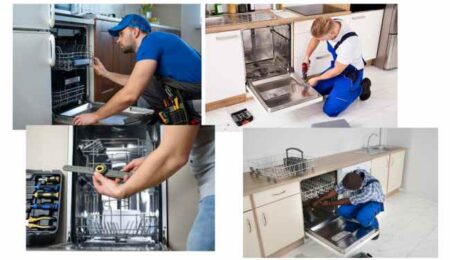
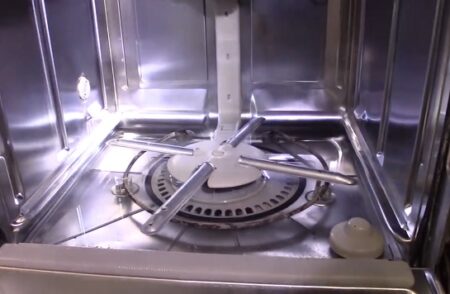



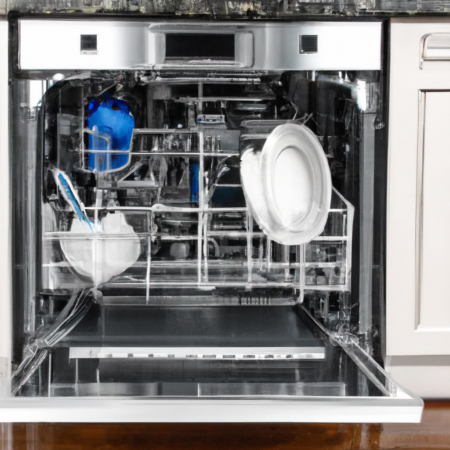



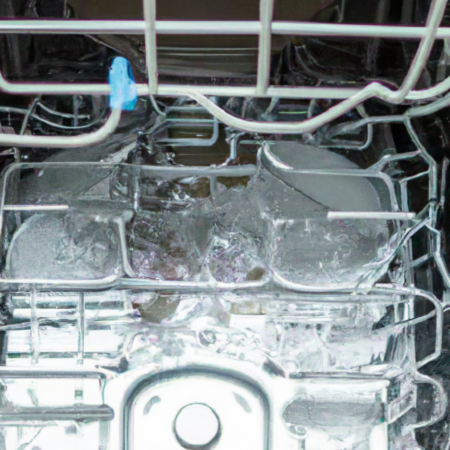
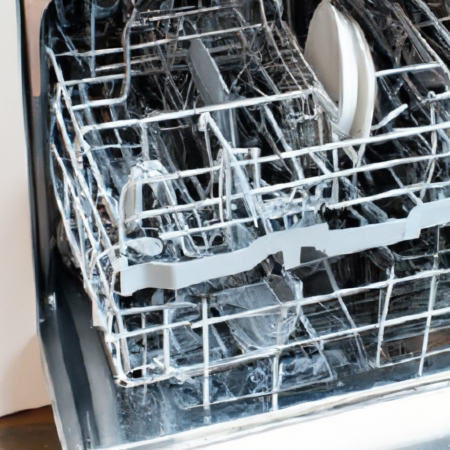
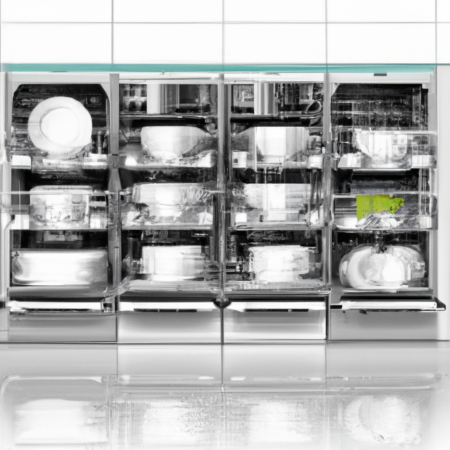
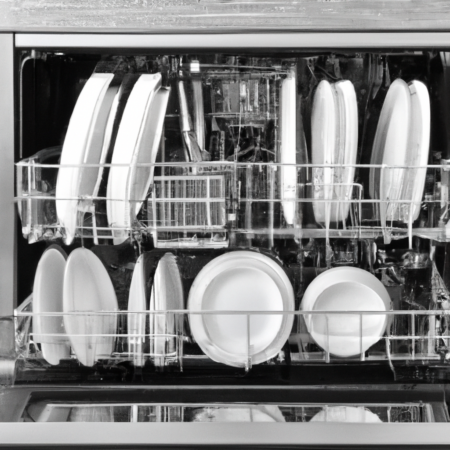
Leave a Reply